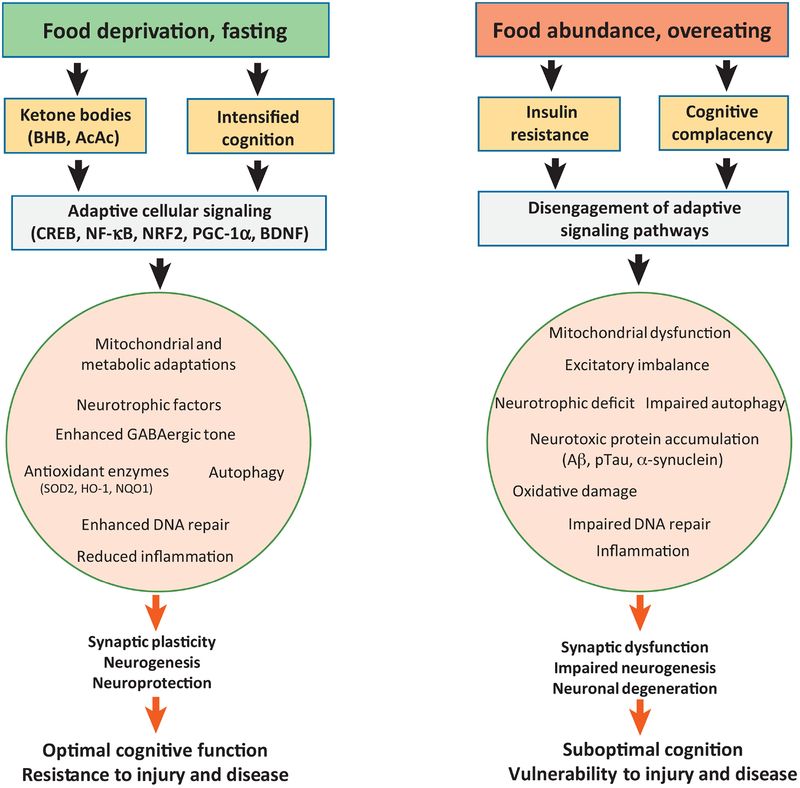
In 10 seconds?
Researchers have found that intermittent fasting – a method used by many to lose weight – has made lab mice sharper thinkers – at least in finding an escape route in a maze test. But does it translate to humans?
I heard that fasting makes you more focused?
Well, many people believe so. San Francisco-based biohacking and 'cognitive modulation' firm HVMN got into the news a few years ago because the whole team engaged in regular intermittent fasting (IF), saying their most productive day was when they didn’t eat at all and that they felt “clarity and calmness”.
OK, but where's the scientific proof?
Several studies emerged in the last decade about the physical benefits of intermittent fasting but only a few focused specifically on how it affects cognition, i.e. our thinking process. A recent study tried to fill this gap. Scientists split mice into three groups: one was allowed to feed whenever, another was free to eat but with a 10% calorie restriction, and the third was only allowed food every second day. Then, the animals were put in a water maze designed to assess spatial learning in rodents and had to swim and find an escape platform. After 10 days, the intermittent fasting mice started to outperform the other groups by finding routes to safety faster.
OK, it’s one study, any other proof?
A review highlighted that an intermittent fasting regime – again in lab animals - had several cognitive benefits. No, not ‘smarter thinking’ but improved spatial memory, associative memory, and working memory. Cognitive benefits were also reported in humans, in a clinical trial, involving older adults with mild cognitive issues. A year-long intermittent fasting regimen improved the subjects' global cognition, verbal memory, and executive function. And, another clinical trial reported a ‘significant improvement’ in the working memory of older people after two years of daily intermittent fasting. The “maze study” also came up with an interesting result: the activity of a cognition-related gene, Klotho, increased in “fasting” mice. This gene is present in humans too, so it’s likely to be the subject of further studies, that could establish whether IF really improves cognition or just slows down decline.
Are there any other beneficial effects of IF on the mind?
We have evidence about the brain and more precisely, neurons – the messengers in our grey matter. According to a review paper, fasting enables cell recovery in neurons. During the fasting period, the recovery "switch" is on, supporting chemical reactions aiding the survival of neurons. During the feeding period, the switch is off helping growth. The same study concluded that fasting improved cognition and slowed down neurodegradation and cognitive decline due to aging, however emphasizing the need for more human studies.

OK, and how is intermittent fasting different from fasting?
IF is not about not eating at all but a combination of ‘feeding windows’ and fasting, either within a day or on certain days. According to this review, it has proven short-to-medium term benefits on glucose and lipid metabolism. The inspiration harks back to prehistoric times when our bodies adapted to the scarcity of food allowing us to function at a high physical and mental level. Other studies suggest that intermittent fasting lowers the risk of diabetes and cardiovascular disease while helping you along the way to achieve and keep a lower body weight – achieving between 0.8 to 13% of weight loss.
Can I really develop a six-pack with this method?
I thought you were interested in whether you become a sharper thinker! OK, let’s say you can step on the right path and not pile on the pounds again. A study from 2015 reported one can drop 3–7% of body weight in a 12-week program. And, researchers comparing a high-protein, low-calorie intermittent fasting plan to a weight loss plan developed for obese individuals found that the intermittent fasting group would regain less body mass, even after a year.
So, should I skip breakfast to ‘eat in a window’?
Only if you're disciplined! Satisfying your cravings in your eating window with sugary foods will not let you achieve the 'clarity, calmness, and productivity' preached by those Californian biohackers. Remember also, that intermittent fasting has not been proven to offer significantly better aesthetic results than other diets.
What is an intermittent fasting plan?
The simplest method is restricting your eating every day to an 8-hour window if you’re a male and a 10–12 hour window if you’re a female.
For lifestyle and social reasons (i.e. dinner with friends or family) many followers simply skip breakfast and only eat from lunchtime.
The ‘human enhancers’ at HVMN signed up for a somewhat tougher regime. The idea is not to eat at all between Monday evening and Wednesday morning.
Their CEO has set up a group and managed to recruit hundreds of followers sharing in his team’s passion for fasting.
